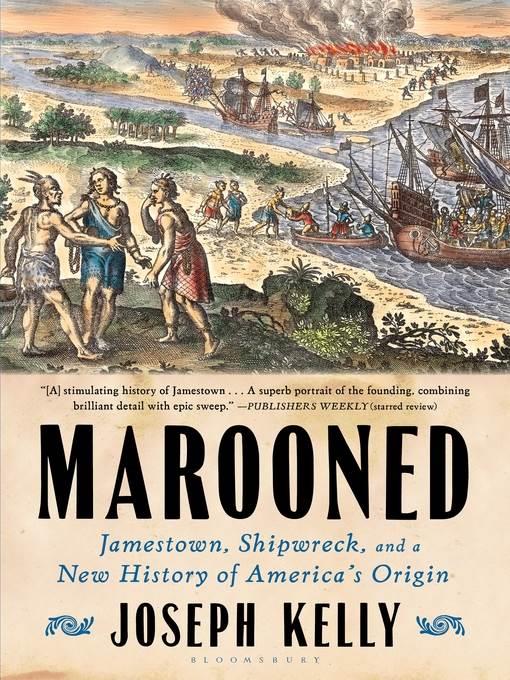
Marooned
Jamestown, Shipwreck, and a New History of America's Origin
کتاب های مرتبط
- اطلاعات
- نقد و بررسی
- دیدگاه کاربران
نقد و بررسی

October 15, 2018
Kelly (literature, Coll. of Charleston; America's Longest Siege) presents a compelling argument: that the seeds of American democracy developed in the harsh experience of the 1607 Jamestown settlement. There, a meritocracy of skills and efforts, argues Kelly, combined with a desperation born out of near starvation, eroded adherence to the old world class system. The social and political organization of the colonies made obtaining supplies from England difficult and unpredictable. Left to their own resources in an unfamiliar environment, settlers chafed at their government's inept rule. Furthermore, the rigid social structure was ineffective when men were "marooned," or isolated in an unexpected place and forced to survive on meager means. More than a dozen mutinies or incidences of insubordination arose in the colony within the first few years. In less than a decade, the challenges of Jamestown led to a democratization of the governing philosophy when a new charter was instituted by James I. VERDICT Citing previous scholarship, this rather dense read is presented with careful attention to appeal to general readers. For historians interested in the challenges of colonization, this groundbreaking work will be well received.--John Muller, Dist. of Columbia P.L.
Copyright 2018 Library Journal, LLC Used with permission.

Starred review from September 3, 2018
America is the land of runaways from colonial tyranny, according to this stimulating history of Jamestown. College of Charleston literature professor Kelly (America’s Longest Siege) recounts the tumultuous five years after the 1607 founding of Jamestown, Va., England’s first permanent colony in America. For ordinary settlers, he writes, it was a time of bitter hardship and virtual enslavement to upper-class soldiers and officials of the London-based Virginia Company, led by Capt. John Smith, a swashbuckler trying to conquer the empire of Native American potentate Wahunsonacock, father of Pocahontas. Amid famine and race war, as starving Englishmen deployed fire and sword to extract corn from Native American villages, Kelly highlights settlers who defied company edicts, escaped the Jamestown gulag, and lived peacefully among the natives. He entwines that saga with the story of a group of Jamestown settlers shipwrecked in Bermuda, who wanted to overthrow the despotic company governor marooned with them and establish an ur-Jeffersonian protodemocracy. Kelly sets this gripping narrative against an intelligent discussion of sociocultural context, ranging from political philosophy to Shakespeare’s The Tempest. He occasionally indulges in rebel romanticism, finding the “real origin story” among “the diggers-up-of-roots, the card players, the fornicators,” but he paints a superb portrait of the founding, combining brilliant detail with epic sweep. Illus. Agent: Jacqueline Flynn, Joelle Delbourgo Assoc.

Starred review from August 15, 2018
An insightful re-examination of the 1607 Jamestown settlement, the story of which is beginning to replace the Mayflower's as America's founding myth.Kelly (Literature/Coll. of Charleston; America's Longest Siege: Charleston, Slavery, and the Slow March Toward Civil War, 2013), the editor of the Seagull Reader series, opens with a recounting of the settlement's dismal beginning. Ships brought about 100 adventurers searching for gold and a passage to the Pacific. Neither turned up, and, unable to obtain food from the unwelcoming natives, most starved to death. Some deserted to the Indians. Others followed John Smith, an ambitious, pugnacious soldier of fortune who made himself leader in 1608 and probably saved the colony by extorting food from native villages. On his decree, "he that will not work shall not eat," rests his "reputation as the first American." However, writes Kelly, "appealing as that view is, it misinterprets what really happened that day in Jamestown. Meritocracy was not established. Democracy did not vanquish aristocracy. John Smith was a tyrant." Mass starvation resumed when he left in 1609, but settlers continued to pour in, eventually exterminating the Indians, and a thriving plantation economy developed. Historians traditionally blame Jamestown's early years on leaders who--John Smith excepted--couldn't handle the unskilled, lazy, and rebellious workers. Kelly makes an astute point: Aristocrats wrote every original document from those years. Reading between the lines, the author points out that the "lower sort" had no say in their governance and were expected to follow orders slavishly. They felt cast into the wilderness, marooned. Many realized that Britain's class system didn't apply in their new land and that survival required everyone's cooperation both in labor and government. Their repeated rebellions were quashed, often viciously, although a limited electoral oligarchy took shape as the century progressed.Discovering seeds of democracy in Massachusetts' zealots or Virginia's autocratic patricians has never been easy, but Kelly's lively, heavily researched, frequently gruesome account gives a slight nod to Jamestown as the "better place to look for the genesis of American ideals."
COPYRIGHT(2018) Kirkus Reviews, ALL RIGHTS RESERVED.

























دیدگاه کاربران